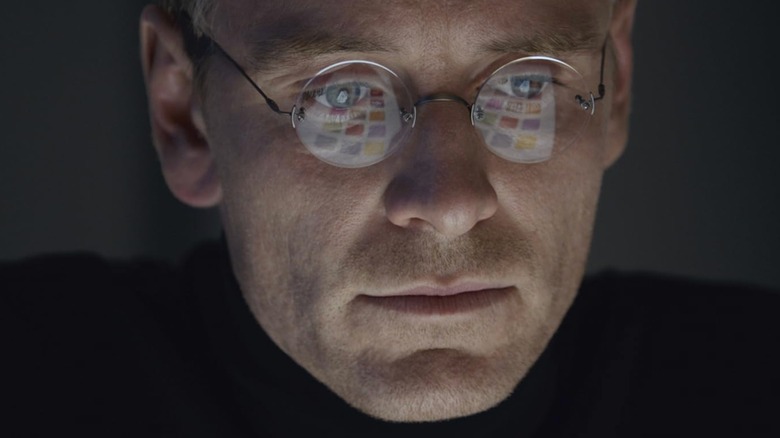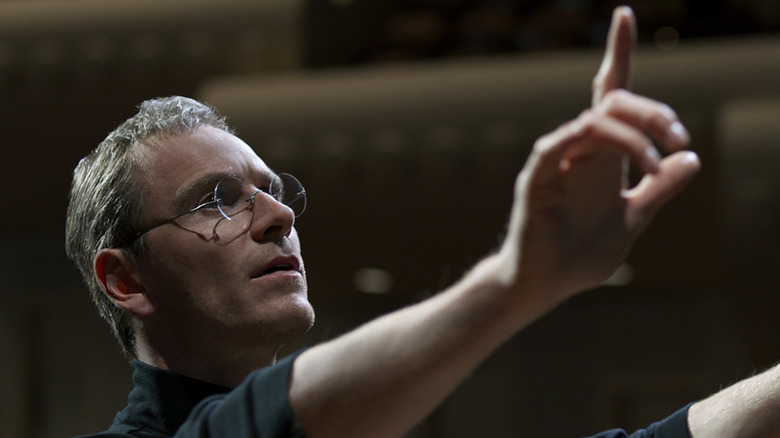Michael Fassbender Wanted To Quit A Drama That Gave Him An Oscar Nomination
What marks the peak of actor Michael Fassbender's career thus far? His role as the stuffy film critic turned British army Left-tenant Archie Hicox in Quentin Tarantino's "Inglourious Basterds" is great fun, while few (except maybe Fassbender himself) would contest that he was a worthy successor to Ian McKellen as a younger Magneto in the "X-Men" movies. Similarly, his performance as the android David, a twisted scientist with an oedipus complex, is always ranked as the highlight of "Prometheus" and "Alien: Covenant."
Ask the Academy, though, and apparently it will say 2013's "12 Years A Slave" — Fassbender got a Best Supporting Actor nomination for playing sadistic slaver Edwin Epps — and 2015's "Steve Jobs," where playing (who else?) Steve Jobs netted him a Best Actor nod. The mid-2010s was, in hindsight, the peak of Fassbender's rising star before it sank a bit thanks to misfires like the video game adaptation "Assassin's Creed" and serial killer mystery "The Snowman."
If Fassbender knew he'd be getting a second Oscar nomination for "Steve Jobs," maybe he wouldn't have tried to get out of doing the movie. On a panel at the 2016 Toronto International Film Festival, the actor revealed (as reported by Vulture) that "Steve Jobs" was the most difficult movie he had made up to that point.
"In rehearsals, I was trying to find a way to get out of the job," Fassbender recalled. He also said (hopefully sarcastically) that during those rehearsals, he told his driver, "'If I put my arm in the door, you should slam it. It should cause a break, and it should get me out of this gig.'"
Fassbender's problem with "Steve Jobs"? The script. Not because it was bad, but because its information overload was difficult for him to wrap his head around.
Michael Fassbender was overwhelmed by the dense dialogue of Steve Jobs
"Steve Jobs" was written by Aaron Sorkin. It's often considered a spiritual follow-up to the Sorkin-penned "The Social Network," which was about Mark Zuckerberg (Jesse Eisenberg) and the founding of Facebook; both films are about tech moguls who changed the world, for good or ill. Indeed, the project was at one point going to be a reunion between Sorkin and "Social Network" director David Fincher (who reportedly wanted Christian Bale to play Jobs). Fincher ultimately sat it out, though, leaving Danny Boyle to direct "Steve Jobs" instead.
Sorkin's dialogue, though often acclaimed, is quite "dense" (as Fassbender noted) and fast-paced. About his style of dialogue, Sorkin has said self-deprecatingly that he "likes the sound of intelligence. I can imitate that sound, but it's not organic. It's not intelligence. It's my phonetic ability to imitate the sound of intelligence."
Lots of conversations in Sorkin's scripts boil down to characters rattling off facts at each other, delivered as fast as the dialogue in any Cary Grant screwball comedy. There's a reason Sorkin's signature move is a "walk and talk," i.e. characters speaking as they walk down hallways, because moving the characters and camera gives the dialogue more propulsion.
At TIFF, Fassbender sounded impressed that Sorkin "wrote all that stuff" in the "Steve Jobs" script, but that didn't make learning it any easier:
"[The script] was such a mountain, and I'm a slow learner, so when the script arrived for me and the opportunity came to play the part, I really thought, 'This is not me. This should be somebody else. It's a miscast scenario.'"
One of the climactic dialogue scenes in "Steve Jobs" is in its second act when Jobs and then-Apple CEO John Scully (Jeff Daniels) have a shouting match. Between the mile-a-minute pace they're both talking at, and cross-cutting to flashbacks of the events they're describing, it's hard to keep track of what they're saying. It's also hard not to be compelled and entertained by the scene.
Fassbender and Daniels' words feel like another instrument in composer Daniel Pemberton's symphony, hardly distinguishable on their own but contributing in perfect sync to a greater sound. Sorkin knows how to write dialogue that sounds intelligent. Fassbender, despite his doubts, proved on "Steve Jobs" he knows how to deliver it.

